The Omicron variant has now been shown to be less sensitive to the antibodies produced by two doses of COVID-19 vaccines. Fortunately, studies show that the other side of immunity, cellular immunity, does not appear to be affected by mutations in the variant, helping to maintain excellent protection against more serious forms of the disease. This would undoubtedly explain that despite the staggering increase in the number of new positive cases, there was a slight increase in hospitalizations, mainly in the vaccinated population.
Antibody resistance
Antibodies are an important aspect of the immune response caused by vaccination against COVID-19: by binding to specific regions (epipers) of the S protein on the surface of the coronavirus, the antibodies can neutralize the circulating virus and thus prevent infection and/or significantly reduce the severity of the virus. the disease.
Too many people have these neutralizing antibodies, either because they’ve been vaccinated or because they’ve had the virus in the past. Thus, this large proliferation of antibodies creates enormous evolutionary pressure on the coronavirus to choose mutations that could allow it to escape this neutralization by the immune system.
The Omicron variant, which appeared recently, appears to be a real giant leap in the acquisition of this ability to evade immunity by the virus: studies carried out to date already indicate a very strong (30 times and more) neutralization by antibodies generated by all current vaccines.(1).
The tremendous speed with which this variant is currently spreading globally clearly shows that this combination of mutations has a marked evolutionary advantage for the virus and that this variant is expected to become the main form of the circulating coronavirus in the short term.
Vaccines are still effective after all
It is clear that the greater resistance of the Omicron variant to antibodies affects the efficacy of the vaccines, but much less than initially expected. For example, data collected in South Africa, the place where the Omicron variant emerged, indicates that the vaccine reduces the risk of serious complications from COVID-19 by 70% and that those vaccinated generally appear to be less sick than the vaccine. Cases observed in previous waves(2).
It has also been shown that a third (booster) dose of mRNA vaccines makes it possible to largely compensate for the loss of immunocompetence and obtain protection similar to that observed against the original viral strain, i.e. about 90%. People at risk of developing complications from COVID-19, either due to age or the presence of comorbidities, can adequately protect themselves from the Omicron variant with a third dose of the vaccine.
Cellular immunity to killer cells
This protection observed against Omicron, despite the reduced activity of neutralizing antibodies, is most likely due to the action of T-lymphocytes. The immune system does not put all its eggs in one basket: at the same time against the antibodies, vaccination activates a battalion of T-lymphocytes that It also has the ability to neutralize the virus: this is called cellular immunity. Some of them, known as killer T cells (or CD8+ T cells), completely destroy virus-infected cells. Others, called helper T cells (or CD4+ T cells) are important for various immune functions, including stimulating the production of antibodies and killer T cells.
Two characteristics of T lymphocytes make them particularly important for fighting a virus like the one we are currently facing:
- These cells have a long memory: after being activated by the virus (either by vaccination or after infection), some clones retain the memory of the presence of the virus and can be quickly reactivated in the event of a new infection. A recent study showed that this memory T-cell remains active for more than a year after infection with the Coronavirus.(3).
- T cells target different parts of the virus than those recognized by antibodies, and these recognized sites may differ from person to person. As a result, a variety of T cells capable of neutralizing the virus are present in a population, making it extremely difficult to select for mutations that could allow the virus to escape this cellular recognition. Moreover, it has recently been shown that the vast majority of epitopes recognized by T lymphocytes differ from the mutations in the Omicron variant, and thus, these mutations do not interfere with T-cell-mediated neutralization.(4).
So it appears that the general picture of omicron immunity is as follows: On the one hand, the decrease in the effectiveness of antibodies against omicron means that the immunity is less able to neutralize the virus through the circulation, which reduces the effectiveness of vaccines against infection due to this variant (these can be found efficacy with a third dose).
On the other hand, T cells cannot prevent infection because it only starts after the virus has infiltrated our cells. However, since it is not affected by virus mutations, it retains the property of eliminating cells infected with the variant and thus prevents the virus from spreading within the body. The end result is that in the majority of cases, the infection remains in a mild state, with the disease not progressing to severe stages requiring hospitalization.
(1) Cameronian E et al. Broadly neutralizing antibodies overcome the antigenic shift of SARS-CoV-2 Omicron. bioRxiv, submitted in pre-release December 14, 2021.
(2) https://www.discovery.co.za/corporate/news-room
(3) Adamo S and others. A CD8+ T-cell signature of long-lived memory in acute SARS-CoV-2 infection. Nature, published December 7, 2021.
(4) Reed Melady et al. Minimal overlap between mutations associated with the Omicron variant of SARS-CoV-2 and CD8+ T epitopes identified in COVID-19 critical individuals. bioRxiv, déposé en prépublication le 9 décembre 2021.

“Extreme twitteraholic. Passionate travel nerd. Hardcore zombie trailblazer. Web fanatic. Evil bacon geek.”


